Mises, Ludwig von. Human Action: A Treatise on Economics
Подождите немного. Документ загружается.

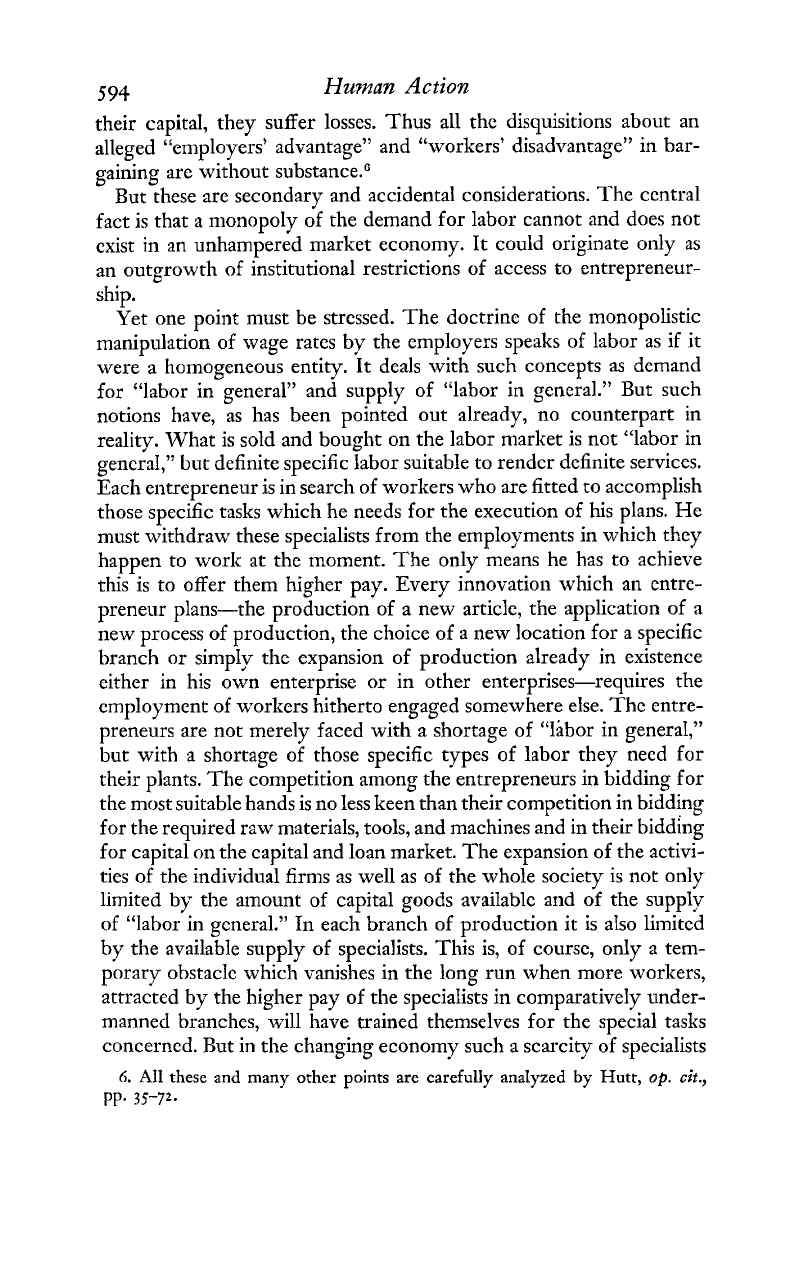
594
Human
Action
their capital, they suffer losses. Thus all the disquisitions about an
alleged "employers' advantage" and "workers' disadvantage" in bar-
gaining are without sub~tance.~
But these are secondary and accidental considerations. The central
fact is that a monopoly of the demand for labor cannot and does not
exist in
an
unhampered market economy. It could originate only as
an outgrowth of institutional restrictions of access to entrepreneur-
ship.
Yet one point must be stressed. The doctrine of the monopolistic
manipulation of wage rates by the employers speaks of labor as if it
were a homogeneous entity. It deals with such concepts
as
demand
for "labor in general" and supply of "labor in general." But such
notions have, as has been pointed out already, no counterpart in
reality. What is sold and bought on the labor market is not "labor in
generd," but definite specific labor suitable to render definite services.
Each entrepreneur is in search of workers who are fitted to accomplish
those specific tasks which he needs for the execution of his plans. He
must withdraw these specialists from the employments in which they
happen to work at the moment. The only means he has to achieve
this is to offer them higher pay. Every innovation which an entre-
preneur plans-the production of a new article, the application of a
new process of production, the choice of a new location for a specific
branch or simply the expansion of production already in existence
either in his own enterprise or in other enterprises-requires the
employment of worlrcrs hitherto engaged somewhere else. The entre-
preneurs are not merely faced with a shortage of "labor in generaI,"
but with a shortage of those specific types of labor they need for
their plants. The competition among the entrepreneurs in bidding for
the most suitable hands is no less keen than their competition in bidding
for the required raw materials, tools, and machines and in their bidding
for capital on the capital and loan market. The expansion of the activi-
ties of the individual firms as well as of the whole society is not
only
.
.
l~mited by the amount of capitai goods avaiiabie and of the suppiy
of "labor in general." In each branch of production it is also limited
by the available supply of specialists. This is7 of course, only
a
tem-
porary obstacle which vanishes in the long run when more workers,
attracted by the higher pay of the specialists in comparatively under-
manned branches, will have trained themselves for the special tasks
concerned. Rut in the changing economy such a scarcity of specialists
6.
All
these
and many other points are carefully anaIyzed by
Hutt,
op.
cit.,
PP.
35-72.
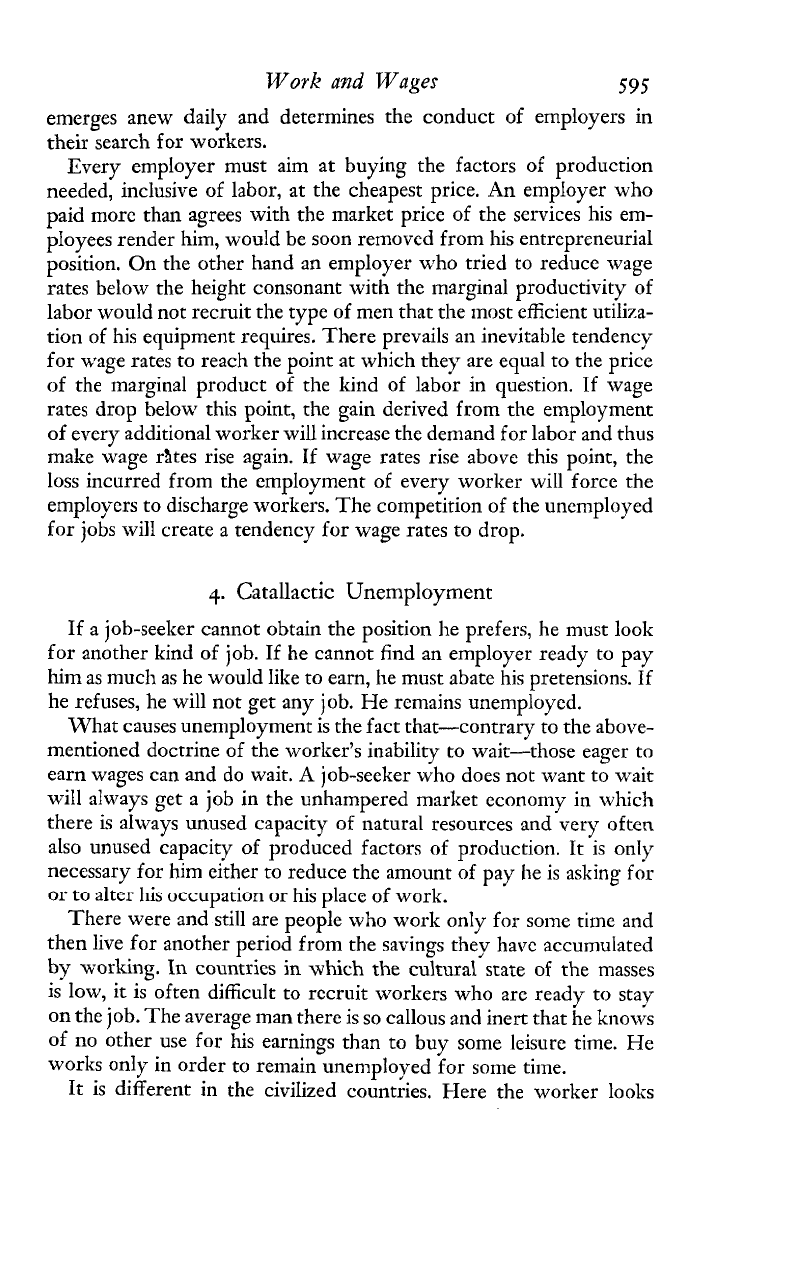
Work
and
Wages
595
emerges anew daily and determines the conduct of employers in
their search
for
workers.
Every employer must aim at buying the factors of production
needed, inclusive of labor, at the cheapest price.
An
employer who
paid more than agrees with the market price of the services his em-
ployees render him, would be soon removed from his entrepreneurial
position. On the other hand an employer who tried to reduce wage
rates below the height consonant with the marginal productivity of
labor would not recruit the type of men that the most efficient utiliza-
tion of his equipment requires. There prevails an inevitable tendency
for wage rates to reach the point at which they are equal to the price
of the marginal product of the kind of labor in question. If wage
rates drop below this point, the gain derived from the employment
of every additional worker will increase the demand for labor and thus
make wage rates rise again.
If
wage rates rise above this point, the
loss incurred from the employment of every worker will force the
employers to discharge workers. The competition of the unemployed
for jobs will create a tendency for wage rates to drop.
4.
Catallactic Unemployment
If a job-seeker cannot obtain the position he prefers, he must look
for another kind of job. If he cannot find an employer ready to pay
him
as much as he would like to earn, he must abate his pretensions. If
he refuses, he will not get any job. He remains unemployed.
What causes unen~ployment
is
the fact that-contrary to the above-
mentioned doctrine of the worker's inability to wait-those eager to
earn wages can and do wait.
A
job-seeker who does not want to wait
will always get a job in the unhampered market economy in which
there
is
aIways unused capacity of natural resources and very often
also unused capacity of produced factors of production. It is only
necessary for him either to reduce the amount of pay he is asking fir
or
to alter his occupation or his place of work.
There were and still are people who work only for some time and
then live for another period from the savings they have accumulated
by
working.
In
countries
in
which the cultural state of the masses
is low, it is often difficult to recruit workers who are ready to stay
on the job. The average man there is so callous and inert that he knows
of no other use for his earnings than to buy some leisure time. He
works only in order to remain unemployed for some time.
It is different in the civiIized countries. Here the worker looks
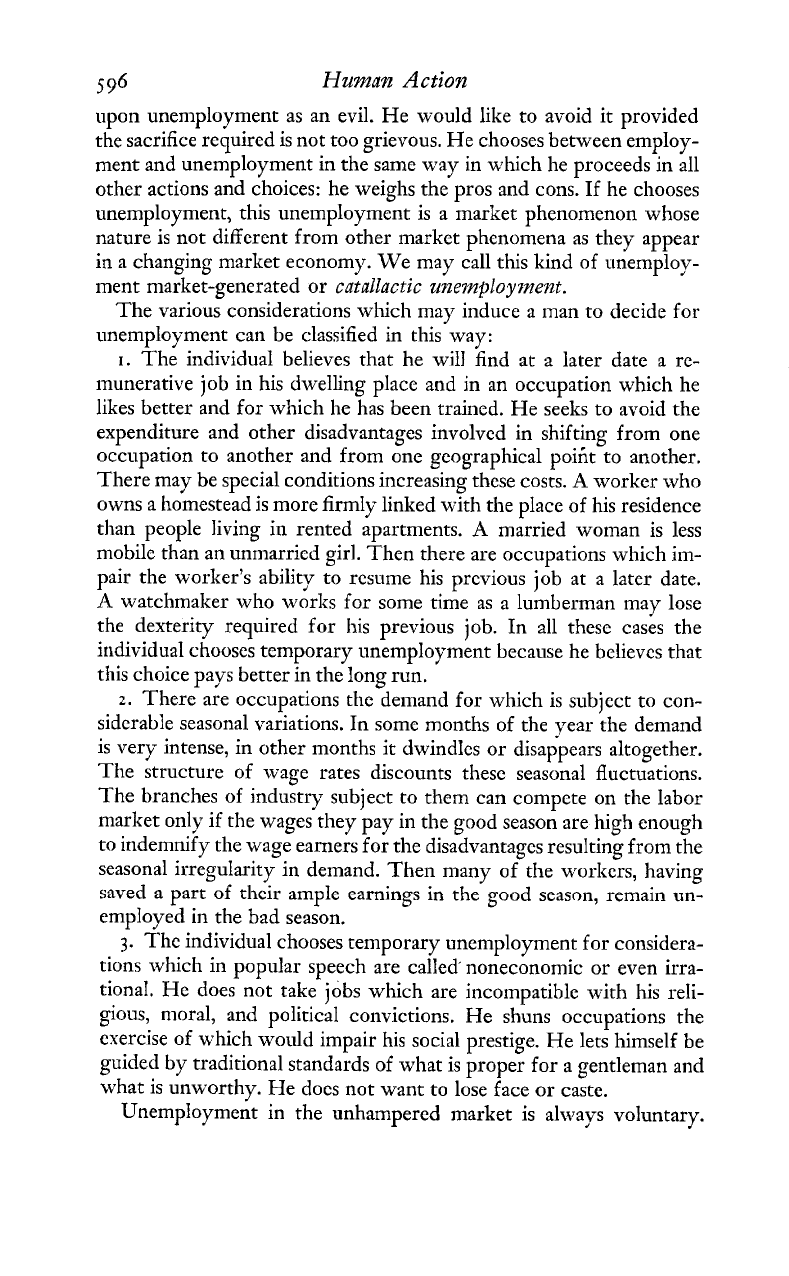
5
96
Human
Action
upon unen~ployment as an evil. He would like to avoid it provided
the sacrifice required is not too grievous. He chooses between employ-
ment and unemployment in the same way in which he proceeds in all
othcr actions and choices: he weighs the pros and cons. If he chooses
unemployment, this unemployment is a market phenomenon whose
nature is not different from other market phcnomena as they appear
in a changing market economy. We may call this kind of unemploy-
ment market-generated or
catallactic unemployment.
The various considerations which maj7 induce a man to decide for
unemployment can be classified in this way:
I.
The individual believes that he will find at a later date a rc-
inunerative job in his dwelling place and in an occupation which he
likes better and for which he has been trained. He seeks to avoid the
expenditure and other disadvantages involved in shifting from one
occupation to another and from one geographical to another.
There may be special conditions increasing these costs.
A
worker who
owns a homestead
is
more firmly linked with the place of his residence
than people living in rented apartments.
A
married woman is less
mobile than an unrnarricd girl. Then there are occupations which
im-
pair the worker's ability to resume his previous job at a later date.
A
watchmaker who works for some time as a lumberman may lose
the dexterity required for his previous job. In all thesc cases the
iildivid~~al chooses temporary unemployment because he believes that
this choice pays better in the long run.
2.
There are occupations the demand for which is subject to con-
siderable seasonal variations. In somc months of the year the demand
is very intense, in other months it dwindlcs or disappears altogether.
The structure of wage rates discounts thesc seasonal fluctuations.
The branches of industry subject to them can compete on the labor
market only if the wages they pay in the good season are high enough
to indemnify the wage earners for the disadvantagcs resulting from the
seasonal irregularity in demand. Then many of the workcrs, having
'..rli0A
n
nnrt
,.C
+Lo;"
*--l,
,n,,.,--
.-r
cL-
---
-----.-
--I-,.-
JLLV~LL
~1.
yaf~
VI
LUCU
LLIII~IL
LCUII;~
>
;II
~11~;
f;~~b
SC;&OII,
ICI&I
ULI-
f;
employed in the had season.
3.
The individual chooses temporary unemployment for considera-
tions which in popular speech are calIed'noneconomic or even irra-
tionaI. He does not take jobs which are incompatible with his reli-
gious, moral, and political convictions. He shuns occupations the
exercise of which would impair his social prestige. He lets himself be
guided by traditional standards of what is proper for a gentleman and
what is unworthy. He does not want to lose face or caste.
Unemployment in the unhampered market is always voluntary.
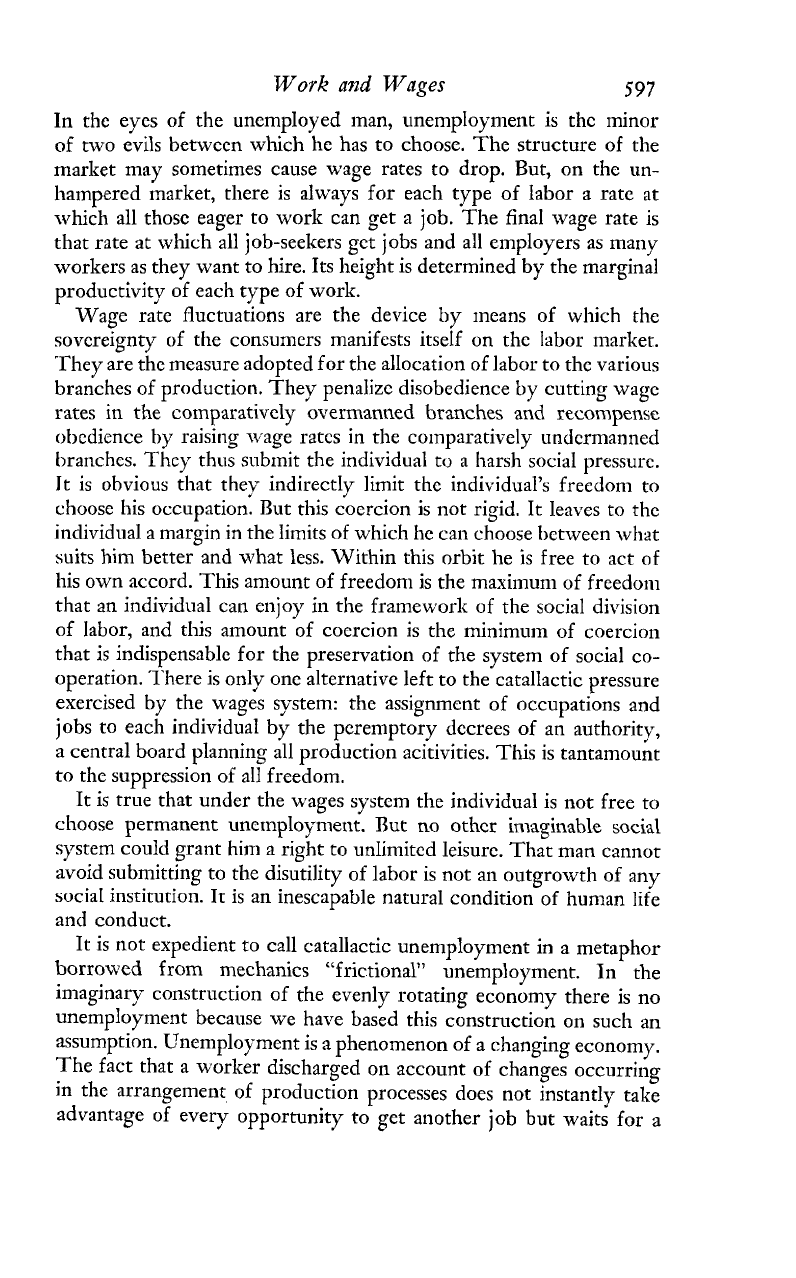
Work
and
Wages
597
In the eyes of the unemployed man, unempIoynient is the minor
of two evils between which he has to choose. The structure of the
market may sometimes cause wage rates to drop. But, on the un-
hampered market, there is always for each type of Iabor a rate at
which all those eager to work can get a job. The final wage rate is
that rate at which all job-seekers get jobs and all employers as many
workers as they want to hire. Its height is determined by the marginal
productivity of each type of work.
Wage rate fluctuations are the device by means of which the
sovcreignty of the consumers manifests itself on the labor market.
They are the measure adopted for the allocation of labor to the various
branches of productior~. They penalizc disobedience
by
cutting wagc
rates in the comparatively overmanned branches and recompense
obedience
by
raising u,age rates in the comparatively undcrrnanned
branches. They thus submit the individual to a harsh social pressure.
It is obvious that they indirectly limit the individual's freedom to
choose his occupation. Rut this coercion is not rigid. It leaves to the
individual a margin in the limits of which
he
can choose 1)etween what
suits him better and what less. Within this orbit he is free to act of
his own accord. This amount of freedom is the maximum of freedom
that an individual can enjoy in the framework of the social division
of labor, and this amount of coercion is the minimum of coercion
that
is
indispensable for the preservation of the system of social co-
operation. There is only one alternative left to the catallactic pressure
exercised by the wages system: the assignment of occupations and
jobs to each individual by the peremptory decrees of an authority,
a central board planning all production acitivities. This is tantamount
to the suppression of
all
freedom.
It is true that under the wages system the individual is not free to
choose permanent
unemployment.
Gut no other imaginable social
system could grant him a right to unIimited leisure. That man cannot
avoid submitting to the disutility of labor is not an outgrowth of any
social institution. It
is
an inescapable natural condition of human life
and conduct.
It is not expedient ro call catallactic unenlployment in a metaphor
borrowed from mechanics "frictional" unemployment. In the
imaginary construction of the evenly rotating economy there is no
unemployment because we have based this construction on such an
assumption. Unemployment is a phenomenon of a changing economy.
The fact that a worker discharged on account of changes occurring
in the arrangement of production processes does not instantly take
advantage of every opportunity to get another job but waits for a
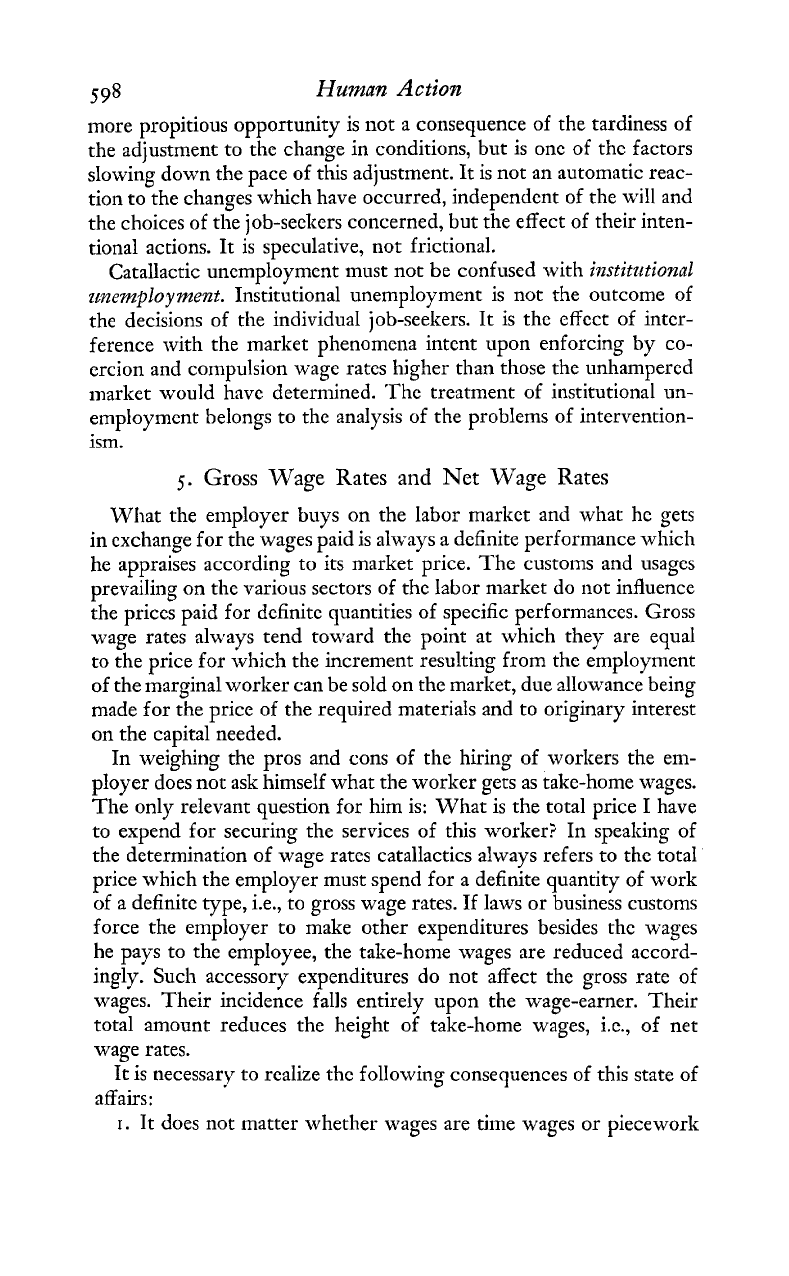
598
Human
Action
more propitious opportunity is not a consequence of the tardiness of
the adjustment to the change in conditions,
bnt
is one of the factors
slowing down the pace of thls adjustment. It is not an automatic reac-
tion to the changes which have occurred, independent of the will and
the choices of the job-seekers concerned, but the effect of their inten-
tional actions. It is speculative, not frictional.
Catallactic unemployment must not be confused with
institutional
z~nemployment.
Institutional unemployment is not the outcome of
the decisions of the individuaI job-seekers. It is the effect of inter-
ference with the market phenomena intent upon enforcing by co-
ercion and compulsion wage rates higher than those the unhampered
market would have determined. 'The treatment of institutional un-
employment belongs to the analysis of the problems of intervention-
ism.
5.
Gross Wage Rates
and
Net
Wage
Rates
What the employer buys on the labor market and what he gets
in exchange for the wages paid is always a definite performance which
he appraises according to its market price. The customs and usages
prevailing on the various sectors of the labor market do not influence
the prices paid for definite quantities of specific performances. Gross
wage rates always tend toward the point at which they are equal
to the price for which the increment resulting from the employment
of the marginal worker can be sold on the market, due allowance being
made for the price of the required materials and to originary interest
on the capital needed.
In weighing the pros and cons
of
the hiring of workers the em-
ployer does not ask himseIf what the worker gets as take-home wages.
The only relevant question for him is: What is the total price I have
to expend for securing the services of this worker? In speaking of
the determination of wage rates catallactics always refers to the total
price which the employer must spend for a definite quantity of work
of a definite type, i.e., to gross wage rates. If laws or business customs
force the employer to make other expenditures besides the wages
he pays to the employee, the take-home wages are reduced accord-
ingly. Such accessory expenditures do not affect the gross rate of
wages. Their incidence falls entirely upon the wage-earner. Their
total amount reduces the height of take-home wages, is., of net
wage rates.
It is necessary to realize the following consequences of this state of
affairs:
I.
It does not matter whether wages are time wages or piecework
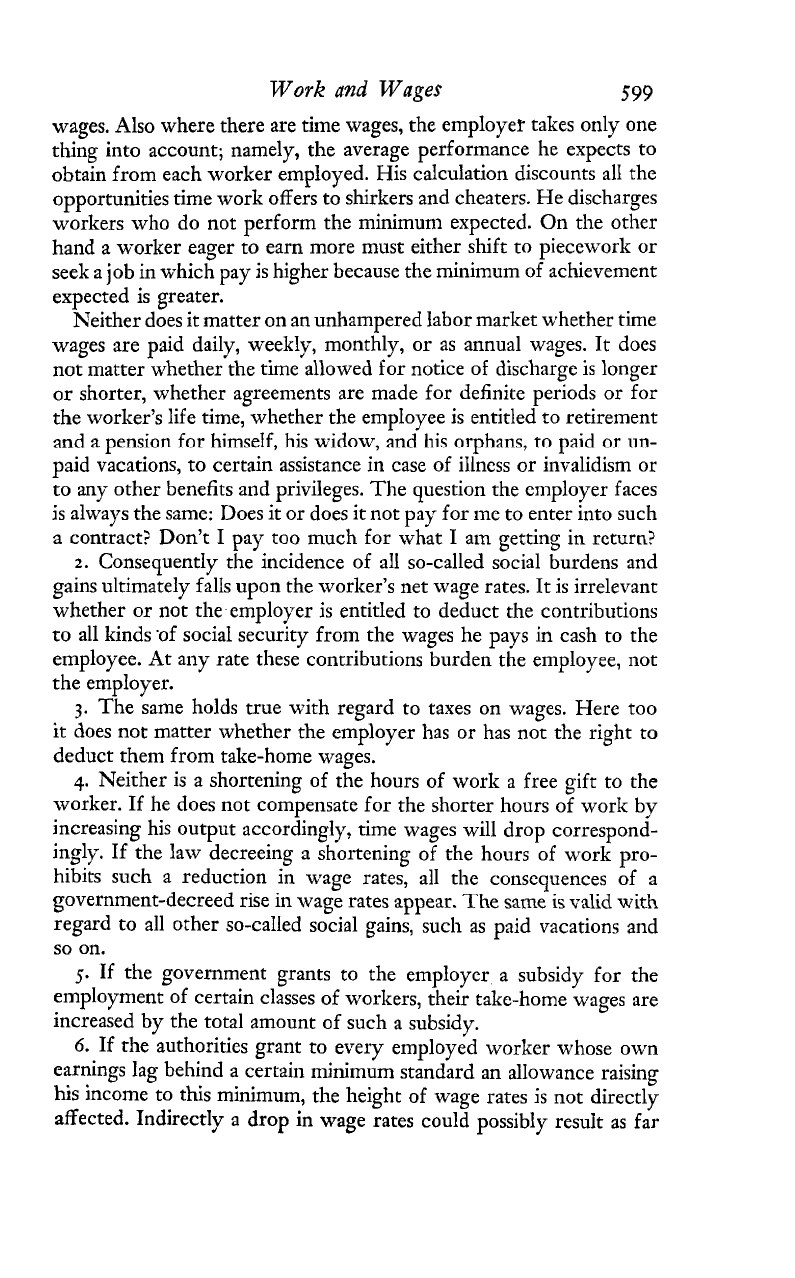
Work
and
Wages
599
wages. Also where there are time wages, the employek takes only one
thing into account; namely, the average performance he expects to
obtain from each worker employed. His calculation discounts all the
opportunities time work offers to shirkers and cheaters. He discharges
workers who do not perform the minimum expected.
On
the other
hand a worker eager to earn more must either shift to piecework or
seek a job in which pay is higher because the minimum of achievement
expected is greater.
Neither does it matter on an unhampered labor market whether time
wages are paid daily, weekly, monthly, or as annual wages. It does
not matter whether the time allowed for notice of discharge is longer
or shorter, whether agreements are made for definite periods or for
the worker's life time, whether the employee is entitled to retirement
and a pension for himseIf, his widow, and his orphans, to paid or un-
paid vacations, to certain assistance in case of illness or invalidism or
to any other benefits and privileges. The question the employer faces
is always the same: Does it or does it not pay for me to enter into such
a contract? Don't I pay too much for what I am getting in return?
2.
Consequently the incidence of all so-called social burdens and
gains ultimately falls upon the worker's net wage rates. It is irrelevant
whether or not the employer is entitled to deduct the contributions
to all kinds 'of social security from the wages he pays in cash to the
employee. At any rate these contributions burden the employee, not
the employer.
3.
The same holds true with regard to taxes on wages. Here too
it
does not matter whether the employer has or has not the right to
deduct them from take-home wages.
4.
Neither is a shortening of the hours of work a free gift to the
worker. If he does not compensate for the shorter hours of work by
increasing his output accordingly, time wages will drop correspond-
ingly. If the law decreeing
a
shortening of the hours of work pro-
hibits such a reduction in wage rates, all the consequences of a
government-decreed rise in wage rates appear. The same is valid
with
regard to all other so-called social gains, such as paid vacations and
SO
on.
5.
If the government grants to the employer a subsidy for the
employment of certain classes of workers, their take-home wages are
increased by the total amount of such a subsidy.
6.
If the authorities grant to every employed worker whose own
earnings lag behind a certain minimum standard an allowance raising
his income to this minimum, the height of wage rates is not directly
affected. Indirectly a drop in wage rates could possibly result as far
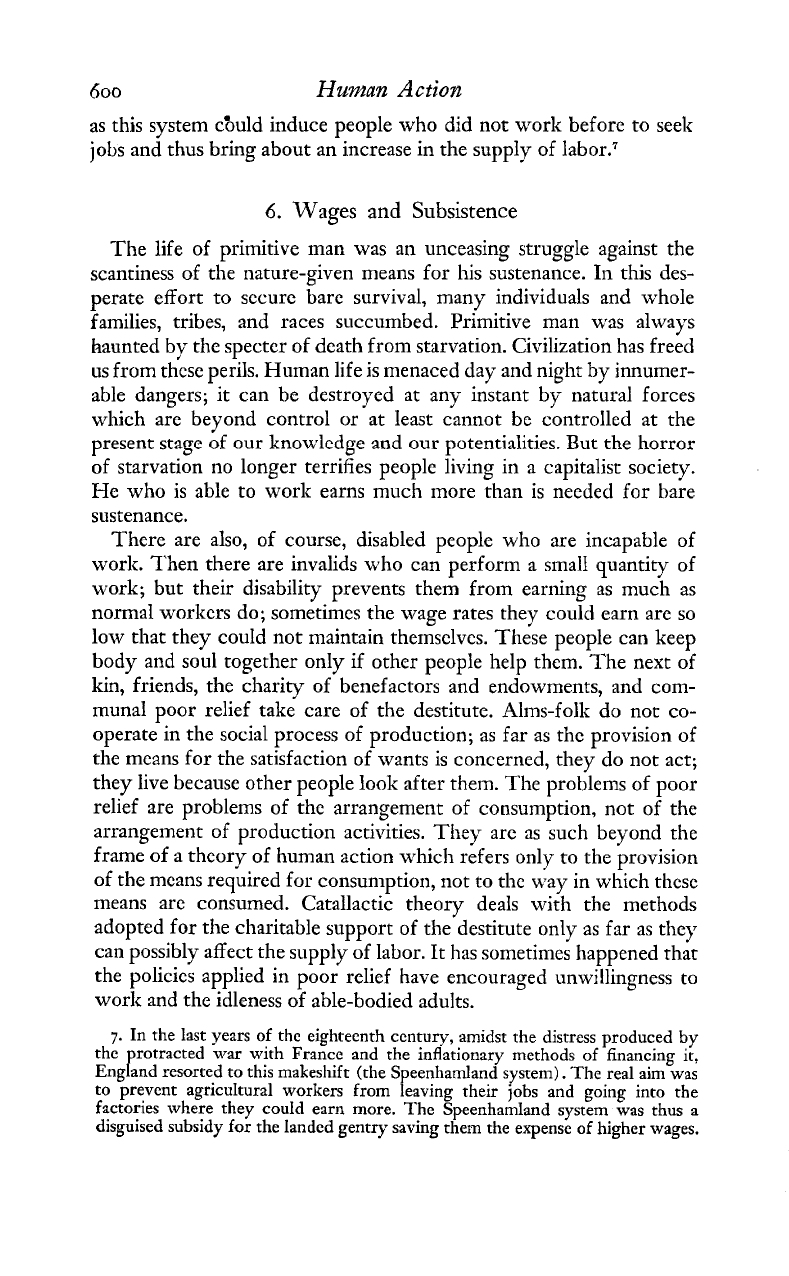
600
Human
Action
as this system c'ould induce people who did not work before to seek
jobs and thus bring about an increase in the supply of labor.'
6.
Wages and Subsistence
The life of primitive man was an unceasing struggle against the
scantiness of the nature-given means for his sustenance. In this des-
perate effort to secure bare survival, many individuals and whole
families, tribes, and races succumbed. Primitive man was always
haunted by the specter of death from starvation. Civilization has freed
us from these perils. Human life is menaced day and night by innumer-
able dangers; it can be destroyed at any instant by natural forces
which are beyond control or at least cannot be controlled at the
present stage of our knowledge and our potentialities. But the horror
of starvation no longer terrifies people living in a capitalist society.
He who is able to work earns much more than is needed for bare
sustenance.
There are also, of course, disabled people who are incapable of
work. Then there are invalids who can perform a small quantity of
work; but their disability prevents them from earning as much as
normal workers do; sometimes the wage rates they could earn are so
low that they couId not maintain themselves. These people can keep
body and soul together only if other people help them. The next of
kin, friends, the charity of benefactors and endowments, and com-
munal poor relief take care of the destitute. Alms-folk do not co-
operate in the social process of production; as far as the provision of
the means for the satisfaction of wants is concerned, they do not act;
they live because other people look after them. The problems of poor
relief are problems of the arrangement of consumption, not of the
arrangement of production activities. They are as such beyond the
frame of a theory of human action which refers only to the provision
of the means required for consumption, not to the way in which these
means are consumed. Catallactic theory deals with the method5
adopted for the charitable support of the destitute only as far as they
can possibly affect the supply of labor. It has sometimes happened that
the policies applied in poor relief have encouraged unwillingness to
work and the idleness of able-bodied adults.
7.
In the last years of the eighteenth century, amidst the distress produced
by
the rotracted
war
with France and the inflationary methods of financing it,
P
Eng and resorted to this makeshift (the Speenhamland system). The real aim was
to prevent agricultural workers from leaving their jobs and going into the
factories where they could earn more. The Speenhamland system was thus a
disguised subsidy for the landed gentry saving them the expense of higher wages.
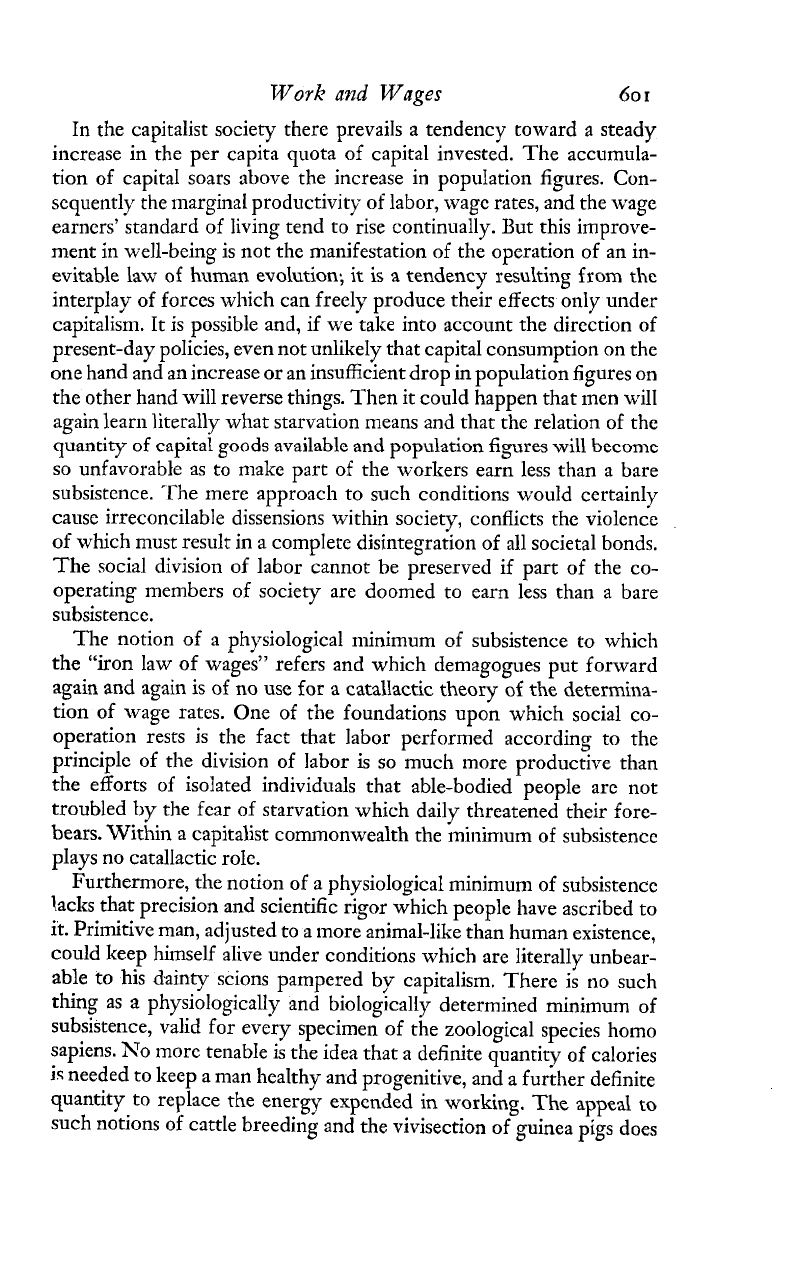
Work and Wages
60
I
In the capitalist society there prevails a tendency toward a steady
increase in the per capita quota of capital invested. The accumula-
tion of capital soars above the increase in popdation figures. Con-
sequently the ~narginal productivity of labor, wage rates, and the wage
earners' standard of living tend to rise continually. But this improve-
nlent in well-being is not the manifestation of the operation of an in-
evitable
law
of human evolution;
it
is
a
tendency resulting
from
the
interplay of forces which can freely produce their effects only under
capitalism. It is possible and, if we take into account the direction of
present-day policies, even not unlikely that capital consumption on the
one hand and an increase or an insufficient drop in population figures on
the other hand will reverse things. Then it could happen that men will
again learn literally what starvation means and that the relation of the
quantity of capital goods available and population figures will become
so unfavorablc as to make part of the workers earn less than a bare
subsistence. The mere approach to such conditions would certainly
cause irreconcilable dissensions within society, conflicts the violence
of which must result in a complete disintegration of all societal bonds.
The social division of labor cannot be preserved if part of the co-
operating members of society are doomed to earn less than a bare
subsistence.
The notion of a physiological minimum of subsistence to which
the "iron law of wages" refers and which demagogues put forward
again and again is of no use for a catallactic theory
of
the determina-
tion of wage rates. One of the foundations upon which social co-
operation rests is the fact that labor performed according to the
principle of the division of labor is so much more productive than
the efforts of isolated individuals that able-bodied people are not
troubled by the fear of starvation which daily threatened their fore-
bears. Within a capitalist commonwealth the minimum of subsistence
plays no catallactic role.
Furthermore, the notion of a physiological minimum of subsistence
lacks that precision and scientific rigor which people have ascribed to
it. Primitive man, adjusted to a more animal-like than human existence,
could keep himself alive under conditions which are literally unbear-
able to his dainty scions pampered by capitalism. There is no such
thing as
a
physiologically and biologically determined minimum of
subsistence, valid for every specimen of the zoological species homo
sapiens. ATo more tenable is the idea that a definite quantity of calories
iq
needed to keep a man healthy and progenitive, and a fukher definite
quantity to replace the energy expended
in
working.
The
appeal to
such notions of cattle breeding and the vivisection of guinea pigs does
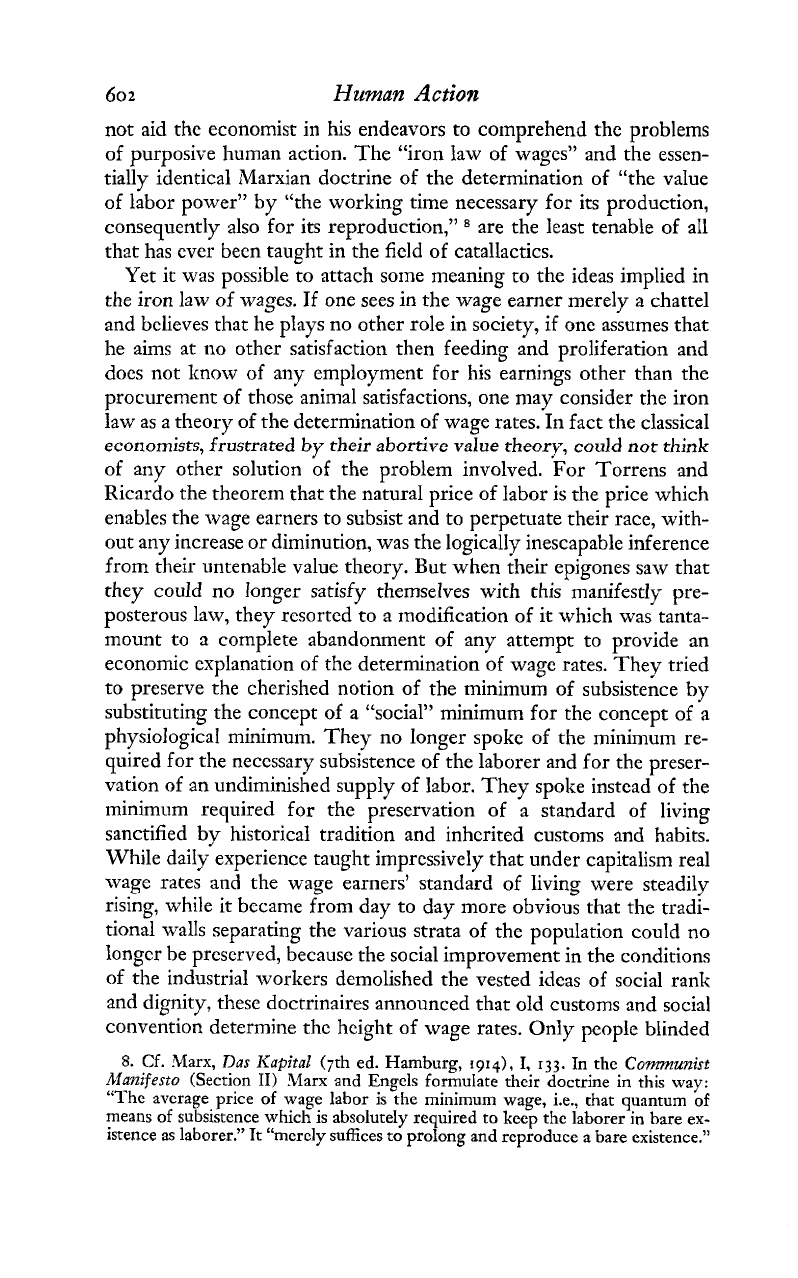
602
Human
Action
not aid the economist in his endeavors to comprehend the problems
of purposive human action. The "iron law of wages" and the essen-
tially identical Marxian doctrine of the determination of "the value
of labor power" by "the working time necessary for its production,
consequently also for its reproduction," are the least tenable of all
that has ever been taught in the field of catallactics.
Yet it was possible to attach some meaning to the ideas implied in
the iron law of wages. If one sees in the wage earner merely a chattel
and believes that he plays no other role in society, if one assumes that
he aims at no other satisfaction then feeding and proliferation and
does not know of any employment for his earnings other than the
procurement of those animal satisfactions, one may consider the iron
law as a theory of the determination of wage rates. In fact the classical
economists, frustrated by their abortive value theory, could not think
of any other solution of the problem involved. For Torrens and
Ricardo the theorem that the natural price of labor is the price which
enables the wage earners to subsist and to perpetuate their race, with-
out any increase or diminution, was the logically inescapable inference
from their untenable value theory. 13ut when fheir epigones saw that
they could no longer satisfy themselves with this manifestly pre-
posterous law, they rcsorted to a modification of it which was tanta-
mount to a complete abandonment of any attempt to provide an
economic explanation of the determination of wage rates. They tried
to preserve the cherished notion of the minimum of subsistence
by
substituting the concept of
a
"social'' minimum for the concept of a
physioIogica1 minimum. They no longer spoke of the minimum re-
quired for the necessary subsistence of the laborer and for the preser-
vation of an undiminished supply of labor. They spoke instead of the
minimum required for the preservation of a standard of living
sanctified by historical tradition and inhcrited customs and habits.
While daily experience taught impressively that under capitalism real
wage rates and the w-age earners' standard of living were steadily
rising, while it bccame from day to day more obvious that the tradi-
tional walIs separating the various strata of the population could no
longer be preserved, because the social improvement in the conditions
of the industrial workers demolished the vested ideas of social rank
and dignity, these doctrinaires announced that old customs and social
convention determine the height of wage rates. Only people blinded
8.
Cf. Marx,
Das Kapital
(7th ed. Hamburg,
1914)~
I,
133.
In the
Communist
Manifesto
(Section
11)
Marx and Engels formulate their doctrine in this way:
"The average price of wage labor is the minimum wage,
i.e.,
that quantum of
means of subsistence which is absolutely required to keep the laborer in bare ex-
istence as laborer." It "merely suffices to prolong and reproduce
a
bare existence."
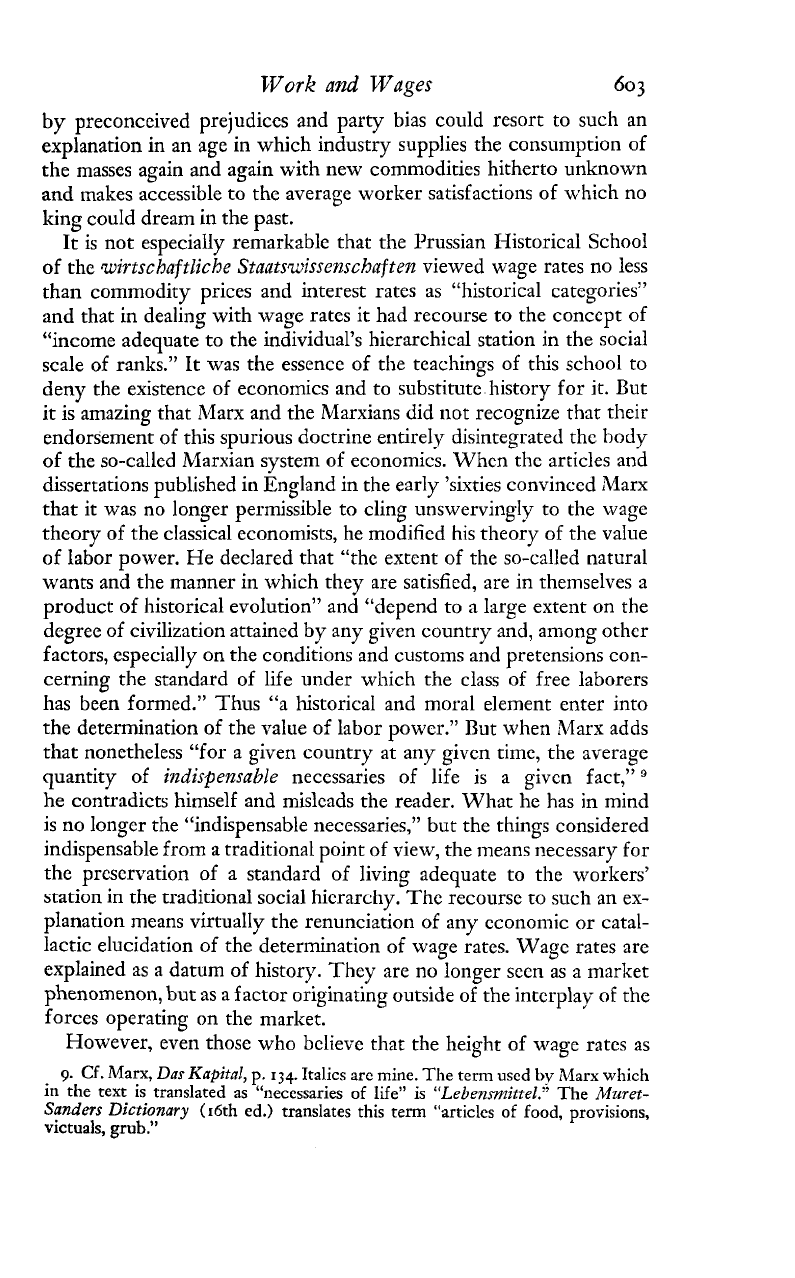
Work
and
Wages
603
by preconceived prejudices and party bias could resort to such an
explanation in an age in which industry supplies the consumption of
the masses again and again with new commodities hitherto unknown
and makes accessible to the average worker satisfactions of which no
king could dream in the past.
It is not especially remarkable that the Prussian Historical School
of the
wirtschaftliche Staatswissenschaften
viewed w-age rates no less
than commodity prices and interest rates as "historical categories"
and that in dealing with wage ratcs it had recourse to the concept of
"income adequate to the individual's
hierarchical
station in the social
scale of ranks." It was the essence of the teachings of this school to
deny the existence of economics and to substitute history for it. But
it is amazing that Marx and the Marxians did not recognize that their
endorsement of this spurious doctrine entirely disintegrated the body
of the so-called Marxian system of economics. When the articles and
dissertations published in England in the early 'sixties convinced Marx
that it was no longer permissible to cling unswervingly to the wage
thcory of the classical economists, he modified his theory of the value
of labor power. He declared that "the extent of the so-called natural
wants and the manner in which they are satisfied, are in themselves a
product of historical evolution" and "depend to a large extent on the
degree of civilization attained by any given country and, among other
factors, especially on the conditions and customs and pretensions con-
cerning the standard of life under which the class of free laborers
has been formed." Thus "a historical and moral element enter into
the determination of the value of labor power." But when Marx adds
that nonetheless "for a given country at any given time, the average
quantity of
indisgensable
necessaries of life is a given fact,"
"
he contradicts himself and misleads the reader. What he has in mind
is no longer the "indispensable necessaries," but the things considered
indispensable from
a
traditional point of view, the means necessary for
the preservation of a standard of living adequate to the workers'
station in the traditional social hicrarchy. The recourse to such an ex-
planation means virtually the renunciation of any cconomic or catal-
lactic elucidation of the determination of wage rates. Wagc rates are
explained as a datum of history. Thcy are no longer seen as a market
phenomenon, but as a factor originating outside of the interplay
of
the
forces operating on the market.
However, even those who believe that the height of wage ratcs as
9.
Cf.
Marx,
Das Kapital,
q;
134.
Italics arc mine.
The
term used
bv
Marx which
in the text is translated as necessaries of life" is
"Lebensmittel."
The
Muret-
Sanders Dictionary
(16th ed.) translates this term "articles of food, provisions,
victuals,
grub!'
